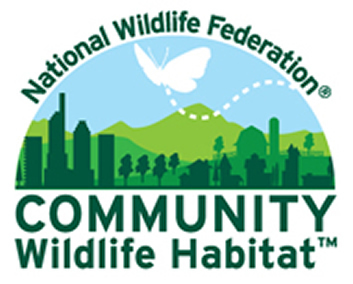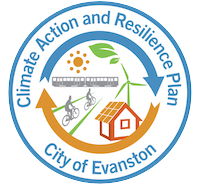The EcoHub Map: Look at all the progress we Evanstonians have made!
The EcoHub Map of Evanston tracks our geo-locatable progress in improving our environmental sustainability across seven dimensions: energy, environmental justice, food, natural habitat, transportation, waste reduction and water. It also includes businesses that currently provide sustainably produced products or supporting services.
On one hand, the level of activity is impressive: few other communities can match our density of dots. On the other, patterns formed by the dots show that we have considerably more to do in making the distribution of benefits and costs more equitably distributed within the city.
Wake it up
Click on it once. From then on it will respond until the page is reloaded.
Reset the map
Reload the web page.
Show/hide sidebar info panel
An information panel at the left side of the map can be made to appear in two ways. Click on the icon at the map’s upper left corner next to the word “EcoHub” to show or hide the sidebar. Or click on a map dot and the panel will appear and display information about the mapped item.
Show/hide layers
All the mapped items in any category can be made to appear or disappear by clicking on the checkbox next to each category head (energy, food, etc.) in the sidebar.
Expand/contract lists
The list of mapped items in this side panel can be expanded and contracted by clicking the downward pointing arrowhead near each layer heading. Clicking on an item in an expanded list will cause its location on the map to be highlighted.
In-map navigation
To zoom in and out of the map, either use the “+” and ”–” in the map’s bottom left corner or use a two-finger trackpad motion normally associated with scrolling up and down. To recenter the map, click-drag in the direction you’d like to go.
To scroll past the map
If using a two-finger scroll, place your fingers off the map. You can also click on the page navigation controls spread in the thin dark grey band along the top of the home page.
Help us make the map even better! To make suggestions, request added locations, edits to locations or removal of locations request edits use this form.
In particular, there are many National Wildlife Federation certified habitats about which we have little information. To add information about your NWF-certified garden, or to opt out of having it appear on the EcoMap, please use the same form.
Our city’s key environmental sustainability achievements
We met our Kyoto Protocol commitment
In 2012 Evanston launched a Community Choice Electricity Aggregation Program to bundle together residential and small business electric accounts to purchase 100% renewable energy on an opt-out basis.
It was the primary factor that allowed our city to meet a tough goal by 2012: make good on its commitment to reduce greenhouse gas emissions in line with the goals set by the Kyoto Protocol. In the process Evanston reduced its annual CO2 emissions by 626 million pounds.
We’re a National Wildlife Federation Community Wildlife Habitat

In June 2019, after a concerted multi-year effort spearheaded by CGE’s Natural Habitat Evanston, Evanston became the first city in Illinois to earn this designation. As noted on NWF’s website: “Communities earn community-wide certification by certifying individual properties (homes, parks, schools, businesses, and others) in their community as Certified Wildlife Habitats and by doing education and outreach in their community. Community Wildlife Habitats garden and landscape with wildlife in mind, promote the use of native trees and plants, work to reduce or eliminate the use of pesticides and chemicals, and integrate wildlife-friendly practices into sustainability plans and park master plans.”
...and our future climate action goals
Our 2018 Climate Action and Resilience Plan

In November of 2018 the City Council passed our third major climate action plan, called Evanston’s Climate Action and Resilience Plan (aka CARP) with aggressive goals, including carbon neutrality by 2050, 100% clean and renewable electricity by 2030, zero waste by 2050, and much more. The more of us who take action, and the sooner we do it, the better the chance we meet our goals.
Action ideas for where you live and work
The suggested actions below represent Citizens' Greener Evanston's perspective on behaviors Evanston residents could adopt to best minimize damage to, and maximize restoration of, our physical environment, with particular attention to meeting our city's climate action goals.
It may not represent the precise priorties or points of view of CGE's constituent organizations.

This one is easy for those who are residents or own small business in Evanston. You’re automatically part of our Community Choice Electricity Aggregation program which has provided program participants green electricity at very low rates since 2012. The aggregation program is crucial to achieving Evanston’s carbon reduction goals.
Like making progress on a New Year’s resolution to lose weight, making progress to reduce energy use at your home or business requires monitoring to both assess the current state and track progress.
Take what you measure and select your targets for energy usage and efficiency improvements. Then execute your plan to achieve those targets to lower greenhouse gas emissions and your energy costs.
You can do more than consume clean energy and cut down on your energy usage. You can also take part in creating clean energy! If you think you may have a roof area that gets plenty of sun, click “More” to learn more about rooftop solar panels (even if you don’t have the money to finance it yourself). If you’re sure you don’t have such a roof, check the next action item (#5): investing in Community Solar.
If your roof doesn’t get year-round sun or you live in an apartment building, you can still help create clean energy by subscribing to community solar, banding together with other Evanston community members and subscribing to a solar farm.

From both nutritional and ecological perspectives, there are common misperceptions to overcome and significant recent developments to consider when deciding what to eat.
There are many reasons to do this beyond reducing fossil fuel used in food transport to reduce our carbon footprint.
We in Evanston have the water and climate to grow herbs, berries, fruits and vegetables at least 8 months a year. You can even raise backyard hens to produce eggs!
Make it clear you care, both to restaurants that meet your expectations and those you'd patronize more if they did.
Use your voice, votes and dollars to help transform our agriculture to maximize its abundance in supporting life on earth.

Any way you cut it, the non-native turf lawn is an environmental disaster. So get over any lingering love you have for the marvelously manicured suburban lawn. That’s so 1950s!
Why not tidy up a garden in the fall? Doesn’t it look better that way?
More and more people say “Leave the Leaves”. To the growing numbers of gardeners aware of the winter needs of birds, bees, butterflies and beneficial insects, tidying leaves is a waste of time and money, and a wasted opportunity to help declining species.
Perhaps you have heard that honeybees are in trouble. That is true, and is a big concern for beekeeping, agriculture and our food supply. But we aren’t just losing the non-native honeybee. Native bees, moths, butterflies, ants, beetles and many other insects that pollinate our crops and gardens are declining. Birds too. It isn’t only that certain species are at risk. Even common birds are becoming less abundant.
What to do? Fortunately, we can make a big difference. Suburbs are key habitat, if we can move away from traditional lawncare and reliance on chemicals.
Every year in the United States up to one billion birds die from collisions with glass and approximately 2.4 billion die from outdoor cats, according to the American Bird Conservancy.
You can reduce bird window strikes at your home with simple, inexpensive steps.
Regarding keeping cats indoors, what’s good for birds is also good for cats: People for Ethical Treatment of Animals urges keeping pet cats indoors for their health.
Because trees reduce carbon pollution and help us adapt to climate change, and because tree mass can be measured, Evanston’s Climate Action and Resilience Plan makes maintaining and expanding the tree canopy on city land a priority, as well as encourages you to do the same on land you own.

Our tap water is high quality, much less expensive with a vastly more environmentally friendly delivery system than single-use plastic bottles.
Energy is used in producing and pumping fresh water through pipes, in heating it, and then in treating it once it goes down your drain and back to a wastewater treatment plant. Here are some ways to get the most out of the water supplied to you.
What you do in and around your home affects water quality well beyond our watershed because it is connected to downstream watersheds and ultimately to oceans.
In Evanston we experience more sudden downpours than we did in years before and more is expected based on climate predictions for our region. We are challenged to avoid drowning in this free resource, and to instead make maximum use of it.
Beyond actions we take at our homes and in our communities, another way to benefit the watershed is to urge our elected officials to support legislation that will improve the health and safety of our water.
Voluntary participation opportunities
Listed below are opportunities to take part in a variety of activities by joining the community of committed Evanston environmentalists in not only making Evanston greener, but also in lessening our ecological footprint outside our borders.
Want to include your organization's environmental participation opportunities for Evanstonians here? Or do you see anything posted here that needs to be changed?
We at Citizens Greener Evanston (CGE) developed and maintain the EcoHub for our fellow citizens to:
1
See and celebrate the progress we Evanston citizens have already made in CGE’s seven environmental interest areas.
2
Find resources like green-certified restaurants and organic grocers, resale shops, electric vehicle charging stations, bike shops, bike lanes and Divvy bike locations.
3
Get even more involved in activities to decrease our environmental footprint, both here in Evanston and other places that supply Evanston with food, energy and materials, and that bury our waste.
4
Access a comprehensive calendar of sustainability focused events, including volunteer work sessions, meetings, and educational event in or near Evanston.